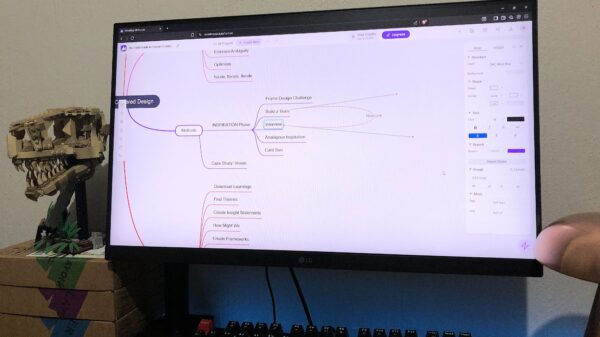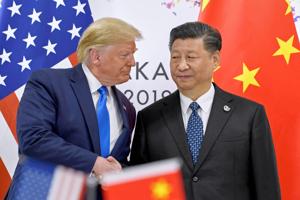President Donald Trump announced on Friday that the United States will impose a new 100% tariff on Chinese imports starting on November 1, 2025, or sooner if circumstances change. This move follows China’s recent restrictions on the export of rare earth elements, which are crucial for a range of technologies. Trump’s statements, made on his social media platform, indicate a significant escalation in the ongoing trade tensions between the two nations.
In his post, Trump remarked that “there seems to be no reason” to meet with Chinese President Xi Jinping during an upcoming trip to South Korea. The proposed tariff would effectively double the existing import taxes on Chinese goods, which already stand at 30%. Financial analysts warned that such steep tariffs could reignite fears of a global recession, similar to concerns that arose earlier this year when the trade war intensified.
The announcement came after U.S. financial markets had closed for the day, with the S&P 500 index dropping 2.7% in response to the heightened tensions. This marked the index’s worst day since April, when Trump last discussed tariff increases. Although the stock market had not reacted to the specific terms of Trump’s latest threat, investor confidence is clearly shaken.
China’s Export Restrictions and U.S. Response
China recently implemented new restrictions on rare earth exports, requiring foreign companies to obtain special approval for shipping these materials. This decision is seen as a direct response to U.S. sanctions against Chinese companies and the escalating trade conflict. Trump criticized China’s actions, stating that the nation is “becoming very hostile” and “holding the world captive” with these restrictions.
In response to China’s measures, Trump announced that the U.S. government would impose export controls on “any and all critical software” from American firms. The implications of these actions could further complicate the already strained relationship between the two largest economies in the world.
According to Sun Yun, director of the China program at the Stimson Center, while Beijing’s reaction to U.S. sanctions has been strong, there remains potential for de-escalation. “There is room for maneuver, especially on the implementation,” Yun stated, highlighting that both sides may seek to avoid a complete breakdown in negotiations.
Despite the tensions, Trump has not officially canceled his planned meeting with Xi, which is scheduled to occur during the upcoming Asia-Pacific Economic Cooperation (APEC) summit in South Korea. The trip is significant, as it includes stops in Malaysia and Japan, where discussions on trade are expected to be a priority.
Impact on Global Trade and Economy
The prospect of renewed tariffs has raised concerns not only about U.S.-China trade relations but also about the potential ripple effects on the global economy. Gracelin Baskaran, director of the Critical Minerals Security Program at the Center for Strategic and International Studies, emphasized that China’s control over rare earths — with 70% of the world’s mining and 93% of production of permanent magnets — gives it significant leverage in trade negotiations.
The original trade war initiated by Trump in 2018 resulted in tariffs totaling 145% on Chinese goods, which prompted retaliatory measures from China. The situation led to a series of negotiations that reduced tariffs to their current levels, but the new threats from Trump suggest that these concessions could quickly unravel.
As the two nations continue to negotiate their economic relationship, differences remain over issues such as access to rare earths, restrictions on advanced technology exports, and agricultural trade. Nebraska Republican Representative Don Bacon noted that China’s market practices have been unfair for years, suggesting that the Trump administration should have anticipated China’s recent actions.
With both nations now reaching for their economic “weapons,” the global community watches closely to see whether diplomatic efforts can temper the escalating trade conflict. The stakes are high, as both sides appear unwilling to back down, raising the risk of a more widespread economic disruption.




































































